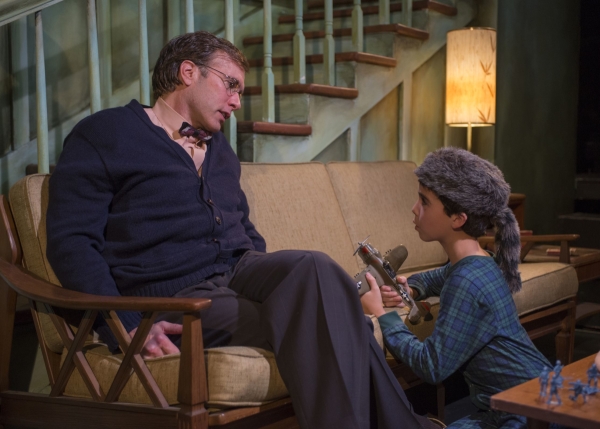The Cryptogram

(© Michael Brosilow)
There's cryptic and then there's inscrutable. The latter dominates in Profiles Theatre's production of David Mamet's spare drama The Cryptogram. Directed by Joe Jahraus, this is a piece marked by excellent performances, taut timing, and one obtuse plot.
The story is told through the eyes of John (Aaron Lamm), a high-strung, prepubescent boy with insomnia and an eerie gift for making nonsense sound like prophecy. He's operating at a fever pitch as he anticipates a pending camping trip with his father and obsessively frets over what to pack and when his father will get home. John's mother is Donny (Abigail Boucher), an exhausted, tense woman who seems to be under siege by an invisible aura of impending doom on their household.
As John compulsively races up and down stairs and his mother wearily prepares tea, Del (Darrell W. Cox), a family friend who tries to calm the kid down, is also reassuring Donny that despite her unshakable sense of looming disaster, everything will ultimately be all right.
The playwright's staccato rhythms define the tense, 80-minute play as the trio of actors delivers rapid-fire bursts of dialogue with an ease that makes Mamet's hyper-stylized text zip and zing through the living-room setting where the drama unfolds. Mamet has set the piece in the 1950s, although there's nothing in the text that demands a specific decade.
Mamet also packs the piece with ordinary objects that seem to take on the importance of talismans as the dialogue urgently ping-pongs across the room. Books, knives, old photographs, and ripped blankets — they all seem freighted with significance well beyond their basic, utilitarian purposes. That pseudo-significance is among the most frustrating aspects of The Cryptogram. Mamet teases the audience by setting up everyday items as portents of some sort, only to leave them wholly unexamined. The effect is that of reading a mystery, only to find out in the final pages that the author didn't want to be bothered solving it.
The cast has a tight grip on Mamet's difficult, machine-gun cadence. Jathaus has done an excellent job of ensuring that every last word feels like it's got something lurking beneath it, like a monster underneath a nightmare-prone child's bed. Cox creates a character that's fraught with concern and a loving protectiveness toward Del's fragile nephew and harried sister-in-law. Boucher is a knot of worry and encroaching despair as John's fearful mother. And as John, Lamm displays a command of language and emotion that's marked by the maturity of an aged sage. His intensity is spooky, as if the ghost of an ancient soothsayer were trapped in the body of a little boy.
The trouble lies in Mamet's decision to leave that dark space below the dialogue absolutely unknowable. It's one thing for an audience to work to discover underpinning truths, but in this case it feels like there's simply nothing to discover. There's much to be said for plays that don't explicitly spell out absolutely every last inference and metaphor. But this play doesn't even give its audience a proper framework for the puzzles it may or may not contain.
Despite the spot-on performances, The Cryptogram ultimately has little to offer. As secrets go, Mamet's buildup around the show's main action eventually reveals that the secrets embedded within the piece actually have about as much substance as "The Emperor's New Clothes."











